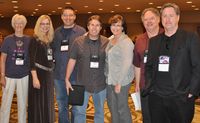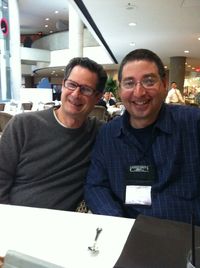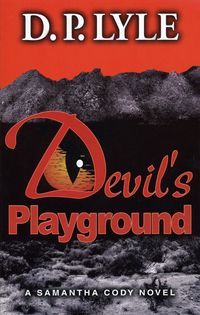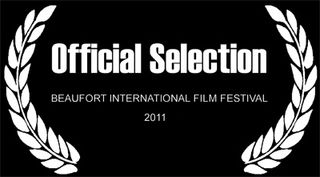Other Random Posts
A Day of Romance
 I spent the day at the Romantic Times conference in Los Angeles, starting with the Mystery Chix and Private Dix breakfast. Before the breakfast, a bunch of us authors got together for an hour or so and had a private, round-table chat about the fast-moving changes in the business and the rise of ebooks. That conversation — with Rhys Bowen, Doug Lyle, Brett Battles, Sue Ann Jaffarian, Lori Armstrong, Robert Gregory Browne, Dianne Emlley, and Doug Lyle — was worth the trip by itself.
I spent the day at the Romantic Times conference in Los Angeles, starting with the Mystery Chix and Private Dix breakfast. Before the breakfast, a bunch of us authors got together for an hour or so and had a private, round-table chat about the fast-moving changes in the business and the rise of ebooks. That conversation — with Rhys Bowen, Doug Lyle, Brett Battles, Sue Ann Jaffarian, Lori Armstrong, Robert Gregory Browne, Dianne Emlley, and Doug Lyle — was worth the trip by itself.
To kick-off the breakfast, attended by a couple hundred romance & mystery readers, I interviewed Bill Link, co-creator of COLUMBO, and then joined my fellow authors in a raffle of our books.
My next gig was a panel on the business of Hollywood with author Stephanie Bond and development exec whose name escapes me (is this a sign of creeping senility?). He was a very nice guy, but he said something I strongly disagreed with. A woman asked the panel what the best way was to present her novel to a development exec for consideration as a movie or TV series.
"Make a book trailer," he said, adding that was the only way to really grab the attention of his bosses and convey the feeling of the book. 
He was a very nice guy… but God, what incredibly bad advice. What the development guy was basically saying was that his boss had the attention span of a 2 year-old, or was illiterate, or was just plain lazy. If the execs at his company can't be bothered to read a punchy paragraph or two, fuck them. You don't want to be in business with people who don't know how to read.
On a more practical note, the only book trailer most authors are capable of producing is going to be a bunch of stock photos, some stock music, and some simple text, all badly edited together into a dull mish-mash. How is that going to put the best spin on your book? Besides, you're authors, not film-makers. Your job is to write a great book and maybe a good summary your agent can use to sell it to Hollywood. If the boss can't envision the movie from the book or summary without an amatuer trailer, the dimwit has no imagination…another reason not to be in business with them.
But it was a lively, fun panel and, outside of that one comment, which I kept making fun of, the development guy gave a lot of really good advice.
I grabbed a quick lunch with my buddy Ken Levine, who was meeting two of his fans, authors Beth Ciotta and Mary Stella, then went off to lead a two-hour seminar on TV writing, which was a lot of fun. Afterwards, I had a long talk with Barry Eisler about the epub biz, which we'll continue over breakfast on Saturday.
All in all, a very busy, and very enjoyable. day.
(Pictured: the mystery chix gang — Rhys Bowen, Lori Armstrong, me, Brett Battles, Allison Brennan, DP Lyle and Robert Gregory Browne and, in the second photo, me and Ken Levine)
What About The Content
In all this discussion about the explosion of ebooks, very little is being said about the quality of the work resulting from this newfound freedom, and that disturbs author James W. Hall, who wrote in a comment here:
You know one thing that keeps being left out of this discussion, Lee, is the writing itself. The traditional publishers (I find the term 'legacy publishers' patronizing and silly) served and continue to serve an important function as gate-keepers. They weren't always right, of course. But by and large good books got published and the "tsunami of sludge" that we're seeing now was kept offshore. Book reviewers had their role in all this, steering readers to 'literary' novels and maintaining or trying to maintain some conventional standards. Again, reviewers often got it wrong, and their bias toward a high culture novel often missed the books that people were actually reading and loving. Books like Peyton Place, say, which was an incredible success despite terrible reviews. That list is endless.
Anyway, with the huge sea change underway, neither reviewers nor publishers have the power they once had and many will say we're better off for that. I'm not one of those. I lament the loss of quality writing in this deluge of self-publishing. Being a hustler is now more important than writing well, creating rich, dimensional people, plots that are both full of surprise but are also coherent.
Writers interviews and blog posts are becoming all about cover art and social networking and the masterful manipulation of Internet outlets. I'm trying to learn my way in this new world even as I keep one foot solidly in the establishment publishing world. I read more than half the books I read on my iPad and my Kindle and realize these new delivery systems are inevitable and very positive in many ways. However, in our rush to embrace what's good about the new, there is far too much dismissiveness and self-congratulation by the emerging New Media stars.
In all this discussion about Hocking and Eisler and Konrath, everything seems to be about the marketing and profitability issues. I've yet to see any real discussion of the aesthetic issues, of storytelling, of graceful style, of all those features that writers and readers used to hold dear. Getting a 70% profit on every book sold is fine. More power to all of us. Karen's comment above is right. These are interesting days. I simply hope that what was good in the best books of the past will survive.
And that in our hurry to embrace and celebrate the new forms of delivery, we will not abandon our love for good writing and the well told story and solid, three-dimensional characters. And the discussion of literary values will someday again be about more than 2.99 versus 1.99.
I agree with his concerns about content and over-emphasis right now on money and marketing. The writing is getting lost in the discussion.
As exciting as this new world is for authors, it's creating a new set of obstacles for novelists hoping to stand out and for consumers trying to find the good stuff amidst the preponderance of unreadable, previously unpublishable, self-published crap that is flooding the e-marketplace.
In the near term, the writers who will benefit are those who already have a platform, mostly from having been published by the old guard before the e-revolution, because that's who readers will turn to first…names and franchises they can depend on…especially after they've been repeatedly burned by horrendous crap from writers they have never heard of.
Even 99 cents is too much when what you are buying is nicely packaged, but unreadable swill.
That's not to say there aren't some great self-published, unknown authors out there…there are many (David Dalglish and David McAfee are just two that I'm happy to have stumbled across). But there's far more who aren't. Far, far more. One need only look at most of the stuff on Smashwords, the aggregator many writers use (including yours truly) to get their books on the iPad, Nook, etc.
Go on, I dare you. It's not pretty.
Despite all the hoopla surrounding Joe Konrath, Barry Eisler, John Locke and Amanda Hocking, it could actually get harder, rather than easier, for new writers to break-through the ever-increasing clutter and sell books in this new, e-publishing world than it was in the "old" print-centric one…
I'm still wildly excited about the opportunities for writers now…but I'm not so caught up in my own enthusiasm not to see the pitfalls for writers and readers alike.
Looking Forward to Charlottesville
I'm doing some panels March 16-20 as a guest of the 17th Annual Viriginia Festival of the Book…but that's not why I can't wait to get there. I'm excited as a reader. The line-up they've got is incredible. Here are some highlights, including:
And here's what's sold out at press time:The Help author Kathryn Stockett in an event sponsored by John and Renee Grisham; the traditionally sold-out festival luncheon, this year with the Newshour's Jim Lehrer, and the Crime Wave luncheon with author and TV series Bones producer Kathy Reichs. The good news: that still leaves 127 other events. For the 17th Virginia Festival of the Book, here are 17 events that caught our eye.
14. Screenwriting large and small. Doesn't everyone have a screenplay lurking, or is that just in L.A.? This panels covers all the screenwriting basics. Lee Goldberg (Diagnosis Murder) takes small-screen writing. Locals Hugh Wilson (First Wives Club, Police Academy) and Paul Wagner (Out of Ireland) handle feature films and documentary writing respectively.
Mark Your Calendars
You don't want to miss this great panel at the Los Angeles Times Festival of Books:
Sunday, 5/1/2011, at 1:30:00 PM, USC Campus
Moderator - Lee Goldberg
Panelists - Thomas Perry, John Vorhaus, Don Winslow
Mark your calendars now.
Dumb Stock Question
I have a dumb question for anyone out there who knows about stocks. I was just going through some old papers and discovered a stock certificate in my name for one share of Libby, McNeill & Libby that, apparently, my grandparents purchased for me the day I was born. From what I can tell, Libby was bought out by Nestle in the 1970s. The stock is actually in my late mother's name as custodian for me under the California Gifts to Minors Act. Is my one share worth anything? If so, how do I go about redeeming it?
Kindle Tales
 A bunch of my friends have new and out-of-print books that have just been released on the Kindle.
A bunch of my friends have new and out-of-print books that have just been released on the Kindle.
Bill Crider's classic westerns RYAN RIDES BACK and MEDICINE SHOW are out and cheap, too.
Doug Lyle has brought back his Samantha Cody books, including DEVIL'S PLAYGROUND.
And James Reasoner, Bill Crider, and Mel Odom have teamed up under the pen name "Colby Jackson" on RANCHO DIABLO, an original series of westerns, that kicks off with SHOOTER'S CROSS.
Check'em out!
Hells Fargo
I want to share with you a Kafka-esque conversation I had today with a representative at Wells Fargo Bank.
But first, some background.
Back in December, my accountant pointed out that I'm apparently paying twice, through automatic withdrawals, for online banking each month. One payment is for $14.95 and is clearly listed as a Wells Fargo online banking fee…the other fee for $15.95 and is listed as an "Online Bill Payment Services Fee."
I called the bank and questioned them about the charges. They said that the ""Online Bill Payment Services Fee" wasn't from them. When they called the number associated with the account, they got "middle eastern music." So I had them put a stop payment on the withdrawal, effective immediately. They did that, said they would investigate the matter, and told me to call back in a couple of weeks for more details on who was taking my money.
So that's what I did. But when I called back, with my claim number and everything, the agent had no idea what I was calling about. I gave him the back story.
"Some entity calling itself 'Online Bill Payment Services" has been withdrawing fifteen dollars a month from my account," I said.
"That is correct. We have stopped that transaction. It won't happen again."
"That's great. Who are they?"
"A bank," he said.
"Your bank?" I asked.
"Another bank."
"Which bank?"
"I can't tell you that information," he said.
"Why not?"
"I can't answer that question," he said.
"Why not?"
"Because that's not my department," he said. "You will need to speak to another department."
"The department that answers questions?"
"I don't appreciate the tone of your voice," he said. "I will send the department a request. They will get back to you in three days. Or maybe more."
"With the name of the bank," I said.
"They might," he said. "Or they might not. They may not know, either."
I took a deep breath. "Okay. Is there anything stopping this other bank from just withdrawing a different amount of money from my account next month? Say, $15.97 or $1500?"
"No, there isn't"
"Can't you put a stop to any automatic withdrawals from my account from that other bank?"
"No, because it's not the bank that is withdrawing the money, but rather a person or business who has an account with them."
"Okay, now we're getting somewhere," I said. "Can you tell me the person or business that is that is taking my money?"
"No," he said.
"So how do I stop this person or business from making withdrawals from my account?
"You have to call Wells Fargo customer service and ask them to put a stop payment on all withdrawals from the person or business."
"But you won't tell me the name of the bank or the person or the business that is taking my money!"
"That is correct," he said. "You don't have to yell."
"I am closing my account," I said.
"It would be easier to put a stop payment on the person or business that is withdrawing your money."
"BUT YOU WON'T TELL ME WHO THEY ARE!"
"That is correct. Can I be of any more service to you today?"
UPDATE 1/25/2011: After that infuriating call, I took a "time out" and called Wells Fargo again. I spoke to a different representative, who was only slightly more helpful.
She was pleased to tell me they were reversing $47 in charges paid to whoever was taking my money. That's only a fraction of what I've lost, but okay, it's a step forward.
She went on to say that the withdrawal is coming from New York Clearing House on behalf of Mid-Peninsula Bank (which a quick web searched revealed was taken over by Wells Fargo in 2007).
She said that, short of me closing down my account, there was nothing they could do to help me prevent future unauthorized withdrawals from Mid-Peninsula Bank. Nor were they willing to help me figure out who at Mid-Peninsula Bank was withdrawing my money, nor were they willing to give me any information I could take to law enforcement to try to figure out who was taking my money.
So I closed my checking account and opened a new one. But because all of our other accounts are at Wells Fargo, and I didn't want the hassle of starting anew at another bank, I ended up staying there.
I went down to my local branch and had a new checking account in about ten minutes. Even so, I am not happy customer.
Is A Story Really Necessary?
This is a dramatization of an actual event.
REMAINDERED is Chosen, Again

My short film REMAINDERED has been chosen as a finalist at the Beaufort International Film Festival in Beaufort, South Carolina this February and we are honored to be up against some very impressive competition.


